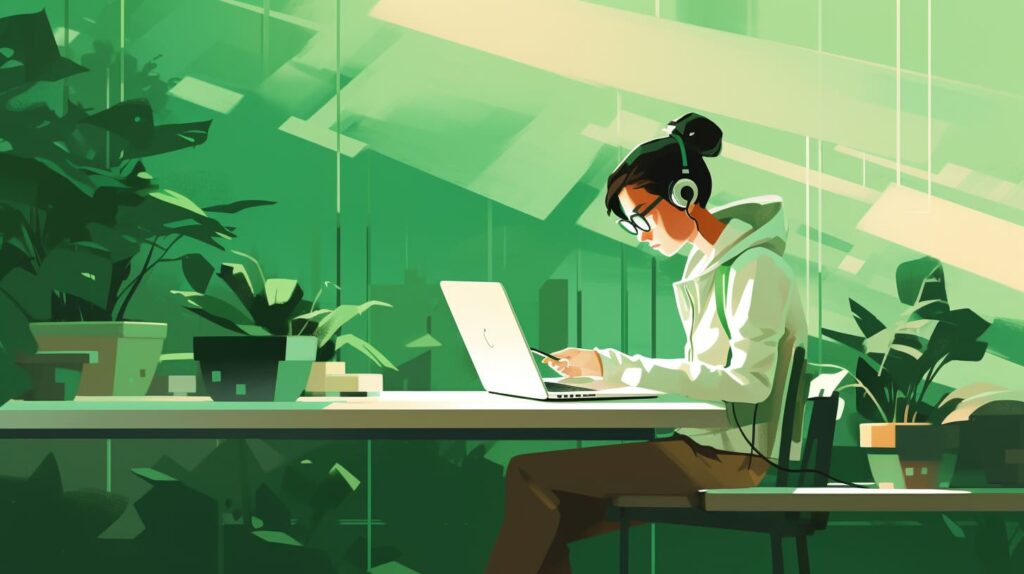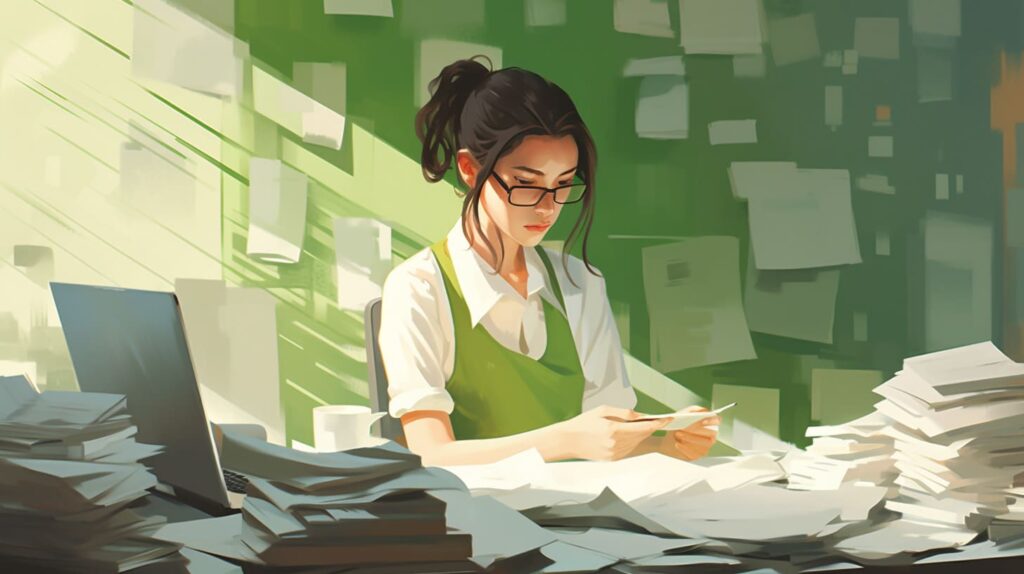Wrapping Your Head Around Critical Thinking at Work
We get you – the term ‘critical thinking’ sounds daunting, almost as if it’s reserved for the philosophers or the high-brow intellectuals. But let’s strip it down to its basics: Critical thinking is simply the ability to analyze information objectively and make a reasoned judgment. It’s something you’re already doing, just without the fancy label.
Now, why would this matter at work? Well, think about it. Every day at work, you’re faced with decisions, big and small. From choosing the best approach for a project to deciding how to handle a disagreement with a colleague, these all require critical thinking in the workplace. It’s an essential soft skill no matter where you are in your career journey.
But here’s the comforting part: Critical thinking isn’t an elite skill only a few possess. It’s a muscle you can train and develop with practice. And you’re here reading this, which shows you’re already on your way to becoming a better critical thinker. So, please take a deep breath, let go of the anxiety, and delve deeper into the world of critical thinking at work. Remember, every expert was once a beginner, and you’re already one step ahead by starting your journey here.
The Role of Critical Thinking in Problem-solving
How Critical Thinking Enhances Problem-solving
We’ve all been there. You’re faced with a problem that seems impossible. It’s easy to feel overwhelmed and need help figuring out where to start. But let’s take a step back and consider how critical thinking can be your secret weapon in problem-solving.

- Identify the problem: Critical thinking helps you cut through the noise and identify the real issue. It’s more complex than it seems, and critical thinking can help you dig deeper to find the root cause.
- Analyze information: Once you’ve identified the problem, gather and analyze information. Critical thinking allows you to evaluate this information objectively, weighing the facts without letting emotions cloud your judgment.
- Develop solutions: Now comes the exciting part – coming up with an answer! Critical thinking encourages you to think outside the box, considering multiple perspectives and options.
- Implement and evaluate: The final step in problem-solving is implementing your solution and assessing its effectiveness. Again, critical thinking plays a crucial role, allowing you to determine the results and make necessary tweaks.
Readers’ Concerns about Applying Critical Thinking
“But I’m not a critical thinker!” I hear you say. “I don’t have the skills or knowledge to apply this approach.” You’re not alone in these concerns. Many people feel intimidated by the concept of critical thinking, believing it’s a skill reserved for academics or high-level executives. But that’s not the case.
Providing Comforting Insights on the Applicability
Here’s the comforting truth: Critical thinking isn’t a mysterious talent only a few possess. It’s a skill that can be learned and improved upon. And it’s not just about being ‘smart’ or ‘intellectually gifted’. It’s about being curious, asking questions, and not taking things at face value.
So, take a deep breath. Remember that you’re more capable than you think. Start small, take it one step at a time, and remember that every problem, big or small, is just an opportunity to learn and grow.
Remember, critical thinking is a journey, not a destination. It’s about continuous learning and growth. So, next time you face a problem, don’t panic. Take a moment to think critically, and you’ll be surprised how much easier problem-solving can be.
Critical Thinking and Decision Making
The Connection Between Critical Thinking and Decision-Making
Hey there, I get it. The world of decision-making can feel like a labyrinth. You’re not alone. This is why we need to talk about critical thinking. Critical thinking and decision-making are like two peas in a pod. They’re entwined. Critical thinking is your flashlight, casting light on the murky decision-making paths. It helps you evaluate information, question the status quo, and see the bigger picture. In other words, it’s your superpower when making informed, well-judged decisions.
Acknowledging the Struggles with Decision Making
Now, let’s address the elephant in the room: Decision-making is sometimes a walk in the park. It can be fraught with self-doubt, confusion, and anxiety. You might feel overwhelmed by the avalanche of choices or frozen by the fear of making the wrong decision. We’ve all been there. The good news? You’re not stuck. The struggles with decision-making are part of the journey, not the destination.
Empowering Tips on Incorporating Critical Thinking into Decision Making
Ready for some good news? There are practical ways to incorporate critical thinking into your decision-making process, making it less of a struggle and more of an adventure. Here are a few tips:
- Question everything. Don’t take information at face value. Be a detective and scrutinize the evidence.
- Look at the big picture. Don’t get lost in the details. Take a step back and consider the broader context.
- Stay open-minded. Don’t shut out alternative viewpoints. Embrace diversity of thought.
- Embrace uncertainty. Don’t fear the unknown. It’s part of the journey.
- Reflect on your decisions. Remember to learn from the past. Your experiences are valuable teachers.
Remember, my friend, critical thinking is more than having all the answers. It’s about asking the right questions. It’s a compass guiding you through the winding paths of decision-making. It’s a process, a journey. So take a deep breath, trust in your ability to think critically, and embrace the adventure of decision-making. You’ve got this.
Developing Critical Thinking Skills
The Necessity of Developing Critical Thinking Skills
Look, I get it. Developing critical thinking skills can feel like a daunting task. But, trust me, it’s an essential aspect of personal and professional growth. These skills help you analyze complex situations, make logical decisions, and stay ahead in your career. Developing critical thinking means enhancing your ability to understand and question things rather than accepting them at face value.

Addressing the Challenges of Skill Development
Finding the journey of developing critical thinking skills challenging is entirely normal. Sometimes, the information may seem overwhelming. Other times, you might question if you’re progressing at all. Remember, these feelings are just part and parcel of the learning process.
It can be especially tough when you’re juggling multiple responsibilities. You may be trying to balance work, family, or school. But don’t let these challenges deter you. It’s not about having extra hours in a day but making the most of the ones you have.
Actionable Advice on Skill Development
Now, let’s get down to business. What practical steps can you take to develop your critical thinking skills? Here are a few suggestions:
- Practice active listening: Don’t just hear, truly listen. Understand the argument, the context, and the perspective.
- Ask questions: Don’t hesitate to question things. This isn’t a sign of ignorance but a step towards knowledge.
- Evaluate evidence: Don’t accept everything at face value. Investigate, evaluate, and form your conclusions.
- Reflect on your decisions: Reflect on the decisions you make. What were the thought processes behind them? What could you have done differently?
Remember, it’s okay to take baby steps. Start small, but stay consistent. With time, you’ll notice significant improvements.
Developing critical thinking skills isn’t just about acing a job interview or impressing your boss (although, it helps with those too!). It’s about improving your understanding of the world around you. So, hang in there. Your journey is unique, and every step is a step towards growth. You’ve got this!
Critical Thinking and Collaboration
Recognize this: You’re in a team meeting, and everyone is tossing ideas around. Suddenly, you find yourself caught in the crossfire of differing opinions, unsure how to navigate. We’ve all been there. But don’t worry. This section is here to discuss two crucial skills in the workplace: Critical Thinking and Collaboration. Let’s dive in.
The Impact of Critical Thinking on Team Work
You might wonder, “What does critical thinking have to do with teamwork?” A lot. Critical thinking allows us to analyze and evaluate ideas objectively. It’s like having a flashlight in a dark room, helping us navigate the maze of conflicting inputs.
When we apply critical thinking to teamwork, it enables us to:
- Identify the strengths and weaknesses of different ideas.
- Make informed decisions quickly.
- Resolve conflicts effectively.
Remember, it’s not about shooting down ideas but finding the best way forward.
Understanding Concerns about Team Dynamics
We get it. Team dynamics can be tricky. Personalities clash. Ideas conflict. It can feel like walking on eggshells, right? But here’s the thing: Team dynamics don’t have to be a source of stress.
Recognize that every team member brings something unique to the table. Understanding these differences is the first step toward a harmonious team dynamic. Remember, diversity of thought can lead to innovative solutions.
Practical Advice on Fostering Critical Thinking within a Team
So, how do we foster critical thinking within a team? It’s more manageable than it seems. Here are some practical tips:
- Encourage open communication: Create an environment where everyone feels comfortable sharing their ideas and concerns.
- Promote diverse viewpoints: Encourage team members to share their unique perspectives. The more angles we consider, the better our solutions.
- Question assumptions: Encourage team members to question underlying assumptions. This can prevent groupthink and lead to more robust decision-making.
Remember, fostering critical thinking isn’t a one-off activity. It’s a continuous process. But with patience and practice, your team will become more collaborative and efficient.
Whether you’re a team leader or a member, understanding the role of critical thinking in collaboration is vital. It can turn the chaos of conflicting ideas into a symphony of solutions. So, the next time you find yourself in that team meeting, remember: it’s not about who’s right, but what’s right. And that’s a game-changer.
Conclusion
As we draw the curtains on this insightful discourse, let’s revisit the paramount importance of critical thinking in the workplace. It’s no secret that it profoundly impacts decision-making, problem-solving, and fostering productive team dynamics. But, we acknowledge that it may seem daunting to some. That’s okay; it’s perfectly natural to feel a bit overwhelmed.
Remember, dear reader, no one is born a master of critical thinking. It’s a skill that can be honed and developed like any other. So, take heart: you can fully nurture this skill and apply it effectively in your work environment. You’re not alone in this journey. Millions have walked this path before and emerged victorious, and so can you.
Embrace this journey of becoming a better critical thinker. It might seem complicated and full of twists and turns, but trust us, it’s worth it. Every step you take towards improving your critical thinking skills is a step towards becoming a more valuable asset to your team and your organization. It’s okay to stumble; it’s okay to fall. What matters is picking yourself up, learning from the experience, and moving forward. And remember, every incredible journey begins with a single step. Your journey towards becoming a better critical thinker starts now. You’ve got this!
Key Points about Critical Thinking in the Workplace
| Key Points | Description |
|---|---|
| Definition of Critical Thinking | Critical thinking is the ability to analyze information objectively and make a reasoned judgment. It involves the evaluation of sources, such as data, facts, observable phenomena, and research findings. |
| Importance in the Workplace | Critical thinking is essential as it helps in problem-solving, decision-making, and achieving company goals. It aids in identifying biases and overcoming them to make a fair judgment. |
| Critical Thinking and Communication | Critical thinking is closely linked with communication. It helps communicate problems, solutions, and strategies to team members and management. |
| Enhancing Critical Thinking Skills | These skills can be enhanced through various methods such as training, workshops, and mentoring programs. Regular practice and application can also significantly improve these skills. |
| Critical Thinking and Innovation | Critical thinking can stimulate innovation. It encourages individuals to think out of the box and create creative solutions to workplace challenges. |
| Evaluation of Critical Thinking | Employers can evaluate an individual’s critical thinking skills through behavioral interview questions, assessments, and observing their problem-solving process. |
| Benefits to Employees | Employees with good critical thinking skills are likelier to be promoted and become organizational leaders. They are also more adaptable to change and better at managing conflicts. |
| Future of Critical Thinking | With the rise of automation and AI, critical thinking is becoming even more crucial as it is a skill that machines cannot replicate. It is expected to be among the top skills employers will look for. |
Tips for Fostering More Critical Thinking in the Workplace
I get it. Critical thinking can feel like an overwhelming task, especially in the workplace. But it’s a skill that can truly set you apart and help you succeed. It’s normal to feel nervous about this, but with practice and perseverance, you can master it. Here are some tips that can help:
- Embrace Curiosity: It’s okay to ask questions. It’s encouraged. Curiosity fuels critical thinking. So, don’t hesitate to ask “why” or “how.”
- Be Open-minded: It’s natural to stick to what we know but try to see things differently. Embrace new ideas. You might surprise yourself with what you discover.
- Analyze Information: Information is abundant, but not all are useful. Learn to distinguish between valuable and irrelevant data. Look for facts and evidence to support your decisions.
- Think Before You Act: Reacting quickly in a busy work environment is easy. But it’s vital to take a moment to think things through. This can save you from future problems.
- Reflect Regularly: Reflection is a powerful tool. Regularly review your decisions and actions. What worked? What didn’t? Use these insights to improve.
- Stay Calm: Stress can cloud judgment. Breathe. Stay calm. Your best thinking happens when you are at ease.
- Embrace Mistakes: It’s okay to make mistakes. They are valuable learning opportunities. Don’t let the fear of making a mistake hold you back.
- Practice Patience: Critical thinking is not a race. It’s okay to take your time. Good decisions often require careful consideration.
Feeling overwhelmed is normal. But remember, every expert was once a beginner. You’ll become a more effective critical thinker with time, patience, and practice. You’ve got this!

